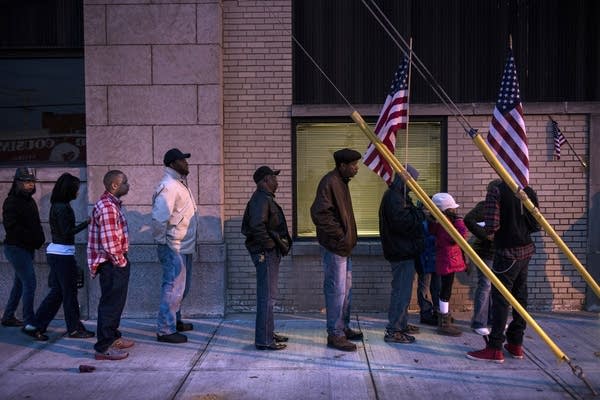Justice official: Register voters automatically

By PETE YOST, Associated Press
WASHINGTON (AP) -- One of the top enforcers of the nation's civil rights laws said Friday that government should be responsible for automatically registering citizens to vote by using existing databases to compile lists of all eligible residents in each jurisdiction.
The proposal by Assistant Attorney General Thomas Perez, chief of the Justice Department's civil rights division, follows an election with breakdowns that forced voters in many states to wait in line for hours.
In remarks at George Washington University law school, Perez said census data shows that of 75 million adult citizens who failed to vote in the 2008 presidential election, 60 million were not registered and therefore ineligible to cast a ballot.
Create a More Connected Minnesota
MPR News is your trusted resource for the news you need. With your support, MPR News brings accessible, courageous journalism and authentic conversation to everyone - free of paywalls and barriers. Your gift makes a difference.
Perez says one of the biggest barriers to voting in this country is an antiquated registration system.
President Barack Obama has said the problem must be dealt with and "we in the Justice Department ... have already begun discussing ways to address long lines and other election administration problems, whether through proposed legislation, executive action and other policy measures," Perez said in prepared remarks. He welcomed his audience to contribute suggestions.
"For too many people in our democracy, the act of voting has become an endurance contest," Perez said. "I used to run marathons; you should not feel like you have endured a marathon when you vote."
Perez said the current registration system is needlessly complex and forces state and local officials to manually process a crush of new registrations, most handwritten, every election season. This leaves "the system riddled with errors, too often, creating chaos at the polls," Perez said. "That's exactly what we saw at a number of polling places on Election Day last week.
"Fortunately, modern technology provides a straightforward fix for these problems -- if we have the political will to bring our election systems into the 21st century," Perez said. "It should be the government's responsibility to automatically register citizens to vote, by compiling -- from databases that already exist -- a list of all eligible residents in each jurisdiction. Of course, these lists would be used solely to administer elections -- and would protect essential privacy rights." He did not say which level of government should be responsible for implementing such changes.
Perez said the nation also must address the problem that 1 in 9 Americans moves every year, but voter registration often does not move with people who move.
Election officials should work together to establish a program of "permanent, portable registration so that voters who move can vote at their new polling place on Election Day," Perez said. In the meantime, he said states should implement fail-safe procedures to correct voter-roll errors and omissions by allowing every voter to cast a regular, nonprovisional ballot on Election Day.
Perez supported allowing voters to register and cast their ballots on the same day. He called same-day registration "a reform we should be considering seriously" because it would promote voter participation.
He said that in the 2008 presidential election, five of the six states with the highest turnout in the country were states with same-day registration. Preliminary turnout estimates for the 2012 election, he said, show that this pattern will likely continue.
Perez also said:
-- The Justice Department will consider whether national standards for counting provisional ballots for federal elections are needed to ensure that voters are not disenfranchised by appearing in the wrong polling place or by poll worker errors.
-- It is "time to rethink our largely partisan system of state and local election administration. We risk leaving our election processes open to partisan mischief -- or to the perception of such mischief. We should have a serious conversation about solutions to this risk, including developing an entirely professionalized and nonpartisan system for administering our elections."
-- Congress should enact legislation that would deter and punish lawbreakers who conduct misinformation campaigns such as telling people that Election Day has been moved or that only one adult per household can cast a ballot. Sens. Chuck Schumer, D-N.Y., and Ben Cardin, D-Md., have introduced the measure.
